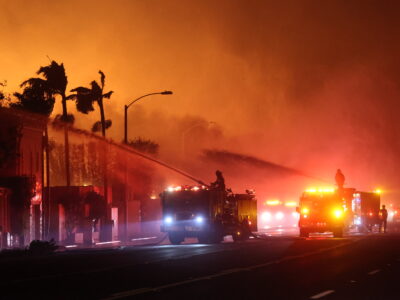General
Did California Policies Make the LA Fires Worse?
California’s environmental and climate regulations did not make the climate-fueled Palisades and Eaton fires more destructive or harder to fight. Here’s why.
We know climate change is partly to blame. Are California’s environmental policies regarding land and water management also to blame for the supercharged firestorm that has ravaged Los Angeles? It’s not just conspiracy theories on social media or misguided news stories; that’s the position of some congressional Republicans and President-elect Trump, who hold power over future …
Continue reading “Did California Policies Make the LA Fires Worse?”
CONTINUE READINGHonoring Michael Zischke (1954-2025)
A Force in the CEQA World
Michael Zischke was a talented and award-winning land use and environmental lawyer, Mike was widely recognized for his extensive expertise in California Environmental Quality Act (CEQA) litigation and compliance.
CONTINUE READINGRed #3 is Going
Will OYGBIV Follow?
Yesterday’s FDA’s ban on the food dye red #3, which takes California’s recent ban nationwide, is welcome and long overdue. Red #3 is a known animal carcinogen, and appears to have been excluded from an earlier FDA ban on its use in cosmetics and externally applied drugs primarily through clerical error. As I described in a …
Continue reading “Red #3 is Going”
CONTINUE READINGClimate Takeaways from Newsom’s Budget Proposal
The Governor’s proposed 2025-26 budget would tap the recent voter-approved climate bond and seek new emergency funds.
For more than a month, California has worked at “Trump-proofing” the State budget. Now you could say the Governor is looking to fire-proof it too. On Friday, as wildfires continued to rage across Southern California, officials from the California Department of Finance presented the Governor’s proposed 2025-26 budget. Earlier in the week, the Governor—who has …
Continue reading “Climate Takeaways from Newsom’s Budget Proposal”
CONTINUE READINGDOGE: A Dodgy Path to Deregulation
It’s supposed to be cost-saving, but the savings are trivial on the scale of the federal budget.
Musk and Ramaswami have said that their DOGE project will cut the federal budget by eliminating unnecessary regulations and cutting regulatory agencies. Putting aside what “unnecessary” means here, that’s not even going to be a downpayment on the kind of budget cuts they’re seeking. The numbers are pretty simple. Suppose they eliminated EPA entirely. That …
Continue reading “DOGE: A Dodgy Path to Deregulation”
CONTINUE READINGLA Fires and the Climate Connection
New UCLA research connects the dots between the climate crisis and the supercharged LA wildfires. “Hydroclimate whiplash” means worse floods, droughts, and fires.
Like millions of Angelenos, I’ve been staying indoors and off the roads, glued to the Watch Duty app, radio, and TV coverage as LA is engulfed by these historic fires. The last 48 hours of coverage has focused, understandably, on the firefight and immediate devastation. Now, it’s time to start hearing about the climate connection, …
Continue reading “LA Fires and the Climate Connection”
CONTINUE READINGGovernment by Reconciliation
The reconciliation process avoids the risk of a Senate filibuster. But it comes wth procedural and political complications.
The GOP’s efforts to accomplish a big agenda through the reconciliation process will face serious complications. The Byrd rule limits the use of reconciliation to achieve non-budgetary purposes. A razor-thin House majority and factional warfare will make it hard to reach deals, as will Trump’s (& Musk;s) distaste for compromise.
CONTINUE READINGGood & Bad Environmental News From the U.S. Supreme Court
Escalating Legal Attacks on California’s Longstanding Clean Air Act “Waiver” Authority
This past week, the U.S. Supreme Court issued important orders in two closely-related environmental cases previously decided by the U.S. Court of Appeals for the District of Columbia. Last Friday the justices granted review in Diamond Alternative Energy v. Environmental Protection Agency, agreeing to decide whether fossil fuel manufacturers have legal standing to challenge an …
Continue reading “Good & Bad Environmental News From the U.S. Supreme Court”
CONTINUE READINGHow to Make Climate as Compelling as Egg Prices
While politicians are right to focus on cost of living, it’s dangerously wrong to assume voters rejected climate policies in the 2024 election.
How do we make the climate crisis as compelling to voters as the price of eggs? That’s a question—an existential question—I’ve been asking myself for weeks now. My UCLA Emmett Institute colleagues and I have some ideas that I’ll be sharing over the next weeks and months. We’re hardly alone: Two months after a disheartening …
Continue reading “How to Make Climate as Compelling as Egg Prices”
CONTINUE READINGWhat’s at Stake in the ICJ Hearings
Representational sovereignty, Indigenous rights, and ecocide are all key to the climate obligations of states, write guest contributors Mollie Cueva-Dabkoski, Julia Phượng Nguyễn, and Molly-Mae Whitmey.
A new chapter of global climate accountability has hopefully begun, as the International Court of Justice (ICJ) prepares to issue an advisory opinion on the Obligations of States in respect of Climate Change. Hearings for that opinion began today with over 100 countries and other parties presenting over two weeks. At the request of the U.N. …
Continue reading “What’s at Stake in the ICJ Hearings”
CONTINUE READING








